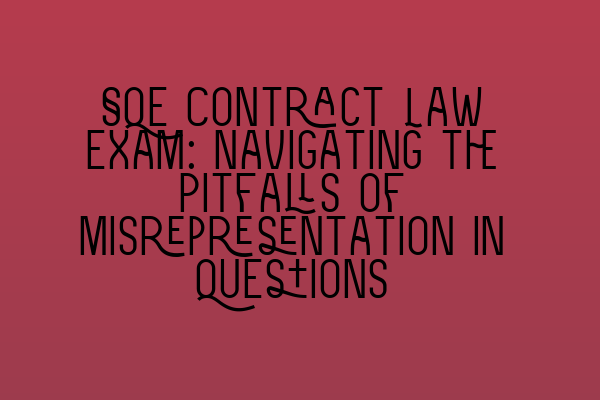SQE Contract Law Exam: Navigating the Pitfalls of Misrepresentation in Questions
Introduction:
As aspiring solicitors, it is crucial to develop a comprehensive understanding of contract law. The Solicitors Qualifying Examination (SQE) tests your knowledge and skills in various legal areas, including contract law. One of the key aspects that candidates must master is navigating the potential pitfalls of misrepresentation in exam questions. In this blog post, we will explore the importance of understanding misrepresentation, identify common pitfalls, and provide strategies for effectively tackling related questions in the SQE exam.
Understanding Misrepresentation:
Misrepresentation refers to a false statement of fact made by one party, which induces another party to enter into a contract. It can occur innocently, negligently, or fraudulently, and it can have significant implications for the validity and enforceability of a contract. As an aspiring solicitor, it is essential to have a firm grasp of the fundamental principles surrounding misrepresentation.
Common Pitfalls in Misrepresentation Questions:
1. Failure to identify the elements of misrepresentation:
When faced with a misrepresentation question, it is crucial to clearly identify the elements that constitute misrepresentation. These include a false statement of fact, made by one party, which induces the other party to enter into a contract. It is essential to analyze the facts given in the question and apply these elements to determine if misrepresentation has occurred.
2. Overlooking the types of misrepresentation:
Misrepresentation can take various forms, such as fraudulent, negligent, or innocent. It is crucial to understand the distinctions between these types and their respective legal consequences. For example, fraudulent misrepresentation may give the innocent party the right to rescind the contract and claim damages, while innocent misrepresentation may only allow rescission.
3. Neglecting the remedies available:
Another common pitfall is failing to consider the remedies available to the innocent party in cases of misrepresentation. These remedies may include rescission, damages, or both, depending on the type and seriousness of the misrepresentation. Understanding the nuances of these remedies is vital for providing accurate and comprehensive answers in the SQE exam.
Strategies for Tackling Misrepresentation Questions:
1. Read the question carefully:
Careful reading and comprehension of the question are crucial for identifying the specific issues related to misrepresentation. Analyze the facts presented and extract the relevant legal principles to ensure a thorough and accurate response.
2. Apply the law correctly:
Demonstrate your understanding of contract law principles by correctly applying them to the given scenario. Clearly state the elements of misrepresentation, discuss the applicable types, and consider the potential remedies based on the facts provided.
3. Use case law and statutes to support your response:
Incorporate relevant case law and statutory provisions into your answers. This not only demonstrates a deeper understanding of the subject but also adds credibility to your response. Referencing cases such as Derry v. Peek or section 2(1) of the Misrepresentation Act 1967 can strengthen your argument.
Conclusion:
Navigating the pitfalls of misrepresentation in contract law questions is crucial for success in the SQE exam. By understanding the elements of misrepresentation, recognizing common pitfalls, and employing effective strategies, you can enhance your chances of providing accurate and comprehensive answers. Remember to read the question carefully, apply the law correctly, and support your response with case law and statutes. Developing proficiency in handling misrepresentation questions will not only contribute to your success in the exam but also better equip you for real-world legal practice.
Related Articles:
1. Exploring Solicitor Salaries in the UK: Average Earnings and Factors Affecting Income
2. Securing Training Contracts: A Roadmap to Becoming a Solicitor
3. Mentorship for Aspiring Solicitors: Nurturing Talent in the Legal Field
4. Legal Challenges and Pitfalls: Navigating the Complexities of the Legal System
5. The GDL (Graduate Diploma in Law): A Pathway to Becoming a Solicitor
